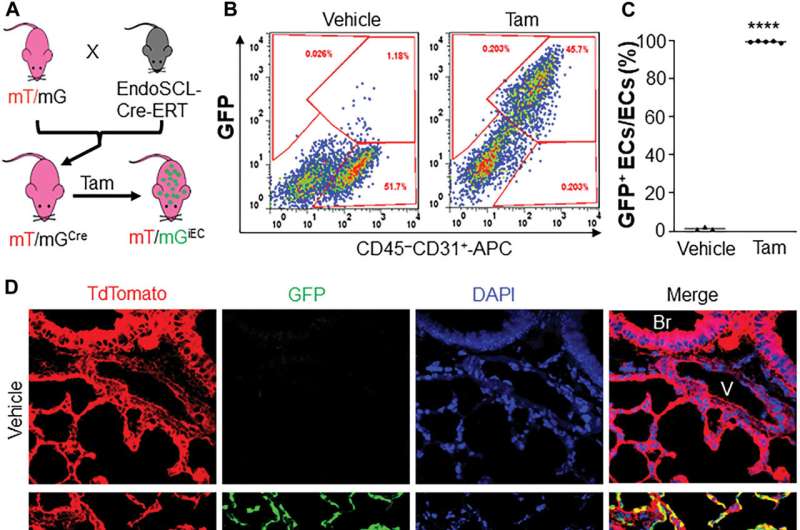This article has been reviewed according to Science X's editorial process and policies. Editors have highlighted the following attributes while ensuring the content's credibility:
fact-checked
peer-reviewed publication
trusted source
proofread
Study discovers novel therapeutic target for acute respiratory distress syndrome

A new Northwestern Medicine study has discovered a novel therapeutic target and therapeutic agents for older patients with acute respiratory distress syndrome (ARDS), according to recent findings published Aug. 16 in Science Translational Medicine.
Approximately 190,000 Americans are diagnosed with ARDS every year, according to the American Lung Association. The disease occurs when fluid leaks into the lungs, depriving the lungs of oxygen entering the bloodstream. ARDS is commonly the result of injury to the lungs, but aging also is a major risk factor and increases the risk of mortality.
Despite advancements in the understanding of ARDS, there are no targeted therapies currently available for patients, and the mortality rate remains high—approximately 40%.
"Compared to young adults, the incidence of ARDS resulting from sepsis, pneumonia and COVID-19 in the elderly is as much as 20-fold greater, and mortality is up to 10-fold greater," said senior study author YouYang Zhao, professor of pediatric clinical care at Northwestern University Feinberg School of Medicine.
Using genetic lineage tracing in both aged and young mouse models of ARDS, Zhao's team found that persistent lung injury and high mortality after sepsis due to ARDS were caused by impaired regeneration of endothelial cells in the lungs—cells that line blood vessels in the lungs to regulate the exchange of oxygen between the bloodstream and surrounding tissue—and lung repair.
Specifically, the expression of the gene FOXM1, a previously known mediator of endothelial cell regeneration, was impaired in the lungs of aged mice but not in younger mice.
"Employing an endothelium-targeted nanoparticle to deliver FOXM1 to the vascular endothelial cells in aged mice could reactivate the regenerative and reparative program and promote survival after sepsis," said Zhao, who also is a professor of pulmonary and critical care medicine and of pharmacology at Feinberg.
To validate their findings, the investigators administered the U.S. Food and Drug-approved chemotherapy drug decitabine in the aged mice, discovering that the drug reactivated endothelial cell regeneration, reversed impaired resolution of lung injury and increased overall survival.
The investigators also obtained samples of lungs infected with COVID-19 from elderly and middle-aged patients. They discovered that FOXM1 expression in lung endothelial cells from patients 80 years and older was not induced, while in samples from patients aged 50 to 60 years, FOXM1 expression was markedly induced.
The findings point to FOXM1 as a promising therapeutic target for elderly patients with ARDS, according to Zhao.
"The delineation of the molecular mechanisms of aging-impaired endothelial regeneration is most important, which could lead to novel therapeutic strategy and agents for potential treatment of ARDS in elderly patients," Zhao said.
More information: Xiaojia Huang et al, Endothelial FoxM1 reactivates aging-impaired endothelial regeneration for vascular repair and resolution of inflammatory lung injury, Science Translational Medicine (2023). DOI: 10.1126/scitranslmed.abm5755


















